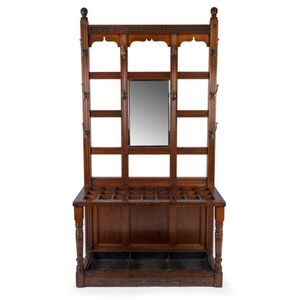Gillows Antique Walnut Hallstand with Brass Hooks and Mirror
Gillows & Co. manufacturers Lancaster fine antique walnut hallstand with brass and horn hooks and bevelled mirror, late 19th century, stamped with design number 'L7931' underneath front rail and 'Gillow & Co. Lancaster' on each side rail. Originally a shop fixture at the Gillows store in Oxford Street, London. 204 cm high, 109 cm wide, 44 cm deep.
You must be a subscriber, and be logged in to view price and dealer details.
Subscribe Now to view actual auction price for this item
When you subscribe, you have the option of setting the currency in which to display prices to $Au, $US, $NZ or Stg.
This item has been sold, and the description, image and price are for reference purposes only.
- Rail - A term used by cabinet makers for the horizontal sections of the frame of an item such as a chair or settee which have a front rail, a back rail and two side rails, and also on a door or carcase, where the rails are joined to the vertical framings.
- Bevel / Chamfer - In furniture making, a chamfered corner refers to a technique used to create a smooth, angled edge on the corner of a piece of furniture. This is typically done by cutting away a small portion of the corner at an angle, typically 45 degrees, creating a diagonal edge, rather than a sharp 90-degree angle. This technique can be used on various parts of a piece of furniture such as table legs, drawer fronts, or door frames. Chamfering can add visual interest to a piece and can help to soften the overall look of a piece of furniture. It is often used in conjunction with other techniques, such as rounding edges or using contrasting wood species to create a more elegant, sophisticated look. Chamfering is a simple way to add a touch of elegance to a piece of furniture and it is a common technique used by furniture makers.
- Signed or Stamped - A signed piece of furniture may mean that the maker has signed (and hopefully dated) the piece in the same way that we sign a cheque, but more likely, that it bears evidence of the name of the maker, wholesaler or retailer as a paper label, metal plaque, impressed into the timber or in later pieces after about 1880, stamped onto the timber with an ink stamp.
The 'signature' or stamp will always be in an unobtrusive position: under the top of a table, on the underside of the rails of a chair, inside a drawer or on the back.
The fact that a piece is 'signed' considerably enhances its value. Signed Australian furniture is extremely rare, and for imported furniture, it is a mark of quality of the item, as only the items by the top makers or retailers were 'signed'
This item has been included into following indexes:
- Gillows of Lancaster (England) - furniture, designers and makers 71
- hallstands, made of
